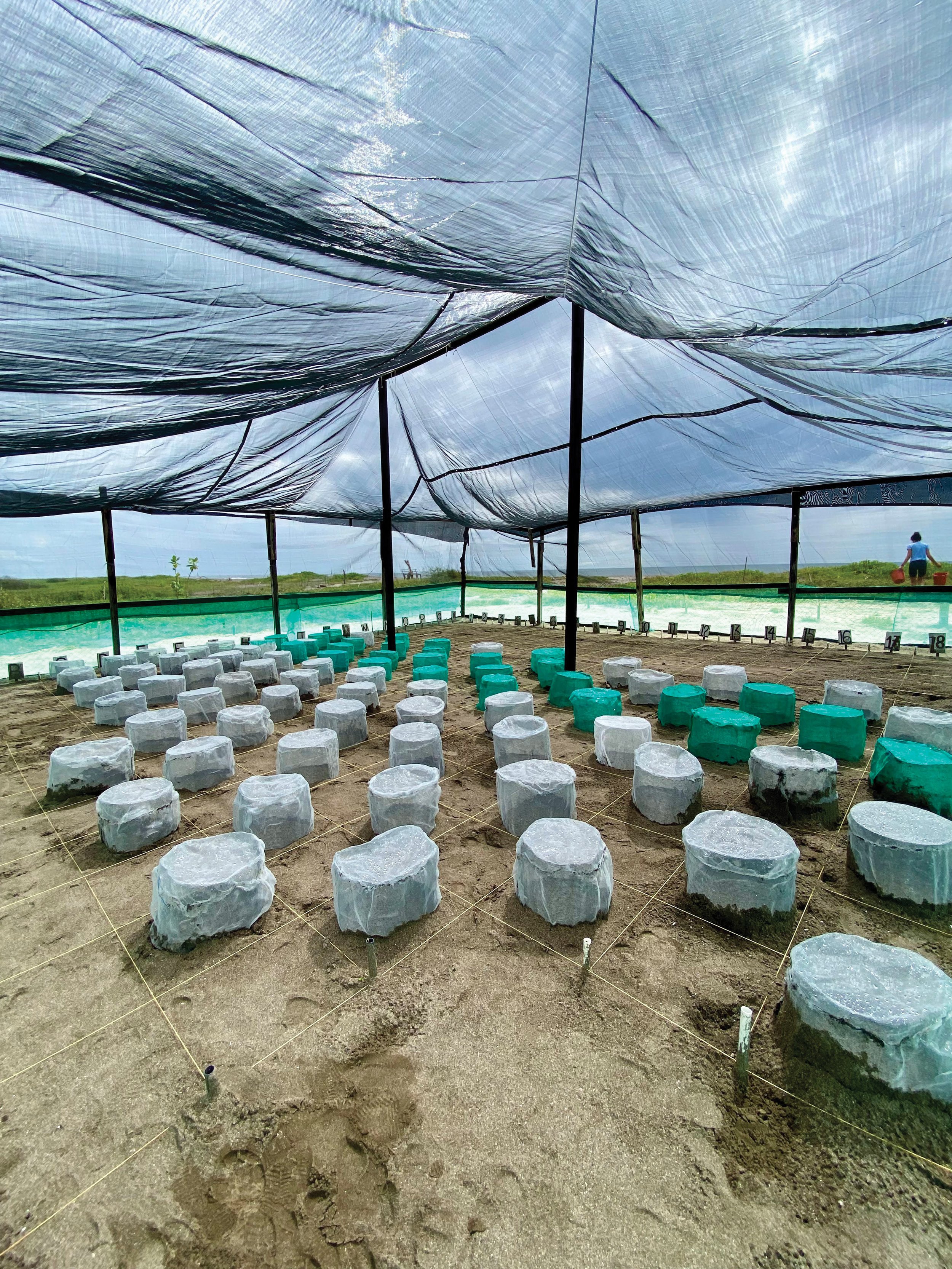Acting Globally SWOT Grant Recipients
SWOT GRANT RECIPIENTS
Since 2006, SWOT’s grants have helped field-based partners around the world to realize an array of important research and conservation goals. To date, 180 grants have been awarded to 135 applicants in more than 57 countries and territories for work addressing four key themes: (a) networking and capacity building, (b) filling of data gaps, (c) behavior change for conservation, and (d) conservation action. The following are overviews of SWOT’s 2024 grantees. Visit www.SeaTurtleStatus.org/grants for application instructions and a list of past SWOT grantees.
© The Olive Ridley Project
Marine Science Department, Khairun University (Indonesia)
Student researchers will design and lead multimedia educational outreach campaigns aimed at protecting sea turtles nesting on Ternate Island. Their goals are to promote conservation among local residents and to measurably reduce egg harvest and plastic pollution by residents.
The Olive Ridley Project (Kenya)
Conservationists will test the use of LED lights on fishing nets as a means of reducing sea turtle bycatch without reducing fishing success. The experiment will begin with eight Kwale County fishers, and findings will be shared broadly among other fishers and stakeholders to promote broader use of mitigation measures.
Community Unification for Responsible Management of Aquatic Resources (Philippines)
The staff of Community Unification for Responsible Management of Aquatic Resources (CURMA) will train 100 sea turtle patrollers and 50 youth ambassadors in CURMA’s sea turtle conservation programs at La Union. Efforts are designed to enhance nationwide turtle protections and foster long-term community engagement.
Brendan Hurley (Northwest Africa)
Brendan Hurley, a GIS expert with the George Washington University in Washington, DC (U.S.A.), will train West African conservation managers in the use of an online framework that he created to refine spatial sea turtle data. Data will be used to build a map of important marine turtle areas in northwest Africa.
© ICCN
Congolese Institute for the Conservation of Nature (Republic of Congo)
The institute will recruit, train, and equip local eco-guards to ensure sea turtle protection by monitoring beaches, collecting doomed clutches, managing hatcheries, reducing egg harvest by local communities, curbing coastal erosion, and more.
Safe Earth Foundation (Nigeria)
Safe Earth Foundation experts will strengthen conservation and build awareness in Akassa by holding community workshops, leading patrols to protect sea turtle nests, and conducting coastal cleanups.
© Centro ECOMAR-UAGro
Julieth Vanessa Tabares Polo (Colombia)
A University of Antioquia student researcher and conservationist will train local beach patrollers in Playa Bobalito to monitor leatherback turtle nesting and gather standardized data on habitat disturbance and other threats.
Provita (Venezuela)
Scientists from this respected nonprofit will examine the interactions between artisanal fishers and sea turtles in the Gulf of Paria to identify strategies for reducing threats such as bycatch and direct take of hawksbills for the shell trade.
AZA-SAFE GRANT RECIPIENTS
Since 2019, SWOT has partnered with the Association of Zoos & Aquariums (AZA) and its Sea Turtle SAFE (Saving Animals from Extinction) Program to make annual grants for projects related to the conservation of two of the top global priorities for sea turtle conservation—eastern Pacific leatherbacks and Kemp’s ridley turtles.
© Sea Turtle Inc.
SOS Nicaragua (Nicaragua)
Staff members and volunteers will educate families on Los Brasiles Island by involving the children of egg harvesters in hatchling releases and by fostering community awareness about the leatherbacks.
Brenda Sarahi Ramos-Rivera (Mexico)
This doctoral candidate will study the socioecological aspects of sea turtle conservation in Punta Maldonado, Guerrero, and will work with fishers and volunteers to protect nests, reduce illegal take, and conduct beach cleanups.
Turtle Island Restoration Network (U.S.A.)
This grant will support the Sea Turtle Hotline in coastal Texas by improving signage and increasing public outreach to facilitate reports of and responses to injured and disabled sea life, especially Kemp’s ridley sea turtles.
Yemanyá–Agua y Conservación (Ecuador)
© Mildred Alpizar Quezada
This initiative will address the threats of nest loss, habitat destruction, and bycatch in artisanal fisheries by educating fishers through workshops and the promotion of turtle-friendly behaviors.
Principia Naturae A.C. (Mexico)
Grant funds will be used to conduct training workshops at fishing cooperatives near leatherback nesting beaches in Michoacán. Training will include techniques for properly handling incidentally captured sea turtles.
JUSTSEA Foundation (Colombia)
A doctoral student and his team will test LED lights on gillnets as well as promote better fishing practices in Buenaventura, Colombia. Both methods are potential solutions to the incidental capture of East Pacific leatherbacks.
Campamento Tortuguero Ayotlcalli (Mexico)
This nonprofit will monitor 15 kilometers (9.3 miles) of beach in Playa Blanca to relocate nests to hatcheries and organize cleanups. This season the organization will increase public outreach activities, including educational presentations, summer camps, and more.
Sea Turtle Inc. (U.S.A.)
This group’s public hatchling releases and community involvement will continue to inspire Kemp’s ridley conservation. Participants will continue to repair and upgrade their hatchery facilities in the aftermath of storm damage in 2024.
Centro ECOMAR-UAGro (Mexico)
Faculty and students will use their grant to hold environmental workshops, training sessions, and cleanups with local fishermen and divers to protect and monitor sea turtles in Acapulco Bay.
© SOS Nicaragua
Universidad Autónoma de San Luis Potosí (Mexico)
The science faculty will assess chemical contaminants affecting Kemp’s ridleys in the Gulf of Mexico. Blood samples and analyses will identify stressors such as hydrocarbons and heavy metals to understand and address environmental health.
César Paúl Ley Quiñónez (Mexico)
A multiyear study, conducted by Universidad Autónoma de Sinaloa professor César Paúl Ley Quiñónez, will investigate the declining sizes of nesting Kemp’s ridleys at Rancho Nuevo to determine the nature and causes of this phenomenon.
Mildred Alpizar Quezada (Mexico)
This study, led by a postgraduate scientist, will explore the interplay of female size, incubation temperatures, and hatchling production to inform strategies for nest protection of East Pacific leatherbacks at Playa Tierra Colorada.
This article originally appeared in SWOT Report, vol. 20 (2025). Download this entire article as a PDF.






